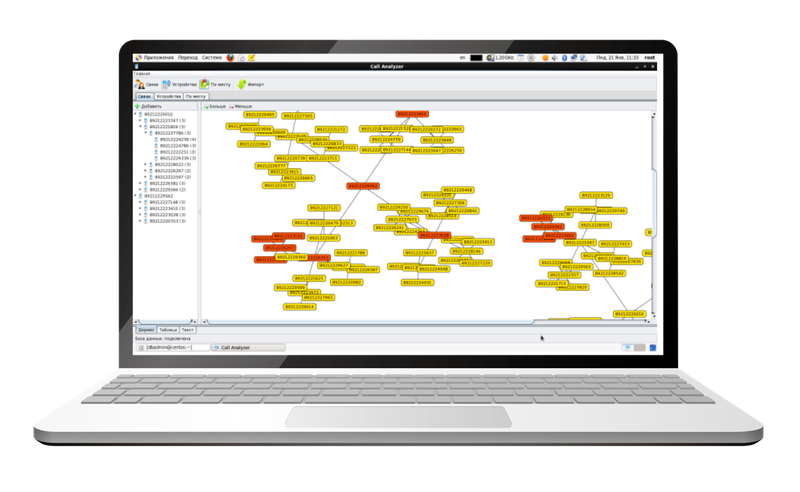1. By person
The initial request parameters can be any mobile phone identifiers (phone number, the ID of the SIM card (IMSI) or mobile phone ID (IMEI)), the date range defined for the analysis and time of day (if necessary, analysis restricted to certain hours of the day), the analysis depth (linked subscribers chain length) and a minimal number of connections taken into account in the analysis. The result of processing is a "tree" of the connections of our “person involved” in graphical form in the text and in a table (the table displays all “persons involved” connections and linked persons) in selecting the tree ties one or more tabular data subscribers are automatically filtered showing only selected subscribers’ connections. The results are displayed in the table connections on the map, allowing to analyze not only contacts of the “person involved” and linked persons, but also to their displacement. Graphical and tabular results of the analysis can be easily extended (the button "copy") to any MS Office document for the report.
2. Mobile terminal and SIM card use
Analysis allows to track in a given time period which SIM card and what numbers are inserted into a known phone or vice versa, in which phones are known SIM card were inserted. The result of the analysis is a table of the vapor-phone SIM card as well as a table of all the connections of these pairs of identifiers. As in the previous analysis - the results of the connection table are automatically displayed on the map. When running this type of analysis is the possibility of finding a new phone number when replacing a SIM card and the phone itself, but the request will be effective only in case of a direct connectivity to wireless carriers billing system databases, for the investigation and search operations conducted by appropriate authority.
3. By location
In this case it is possible to analyze connections in selected areas (e.g., at the crime scene) within a specific time range. BS operator selection is done automatically when you select the area on a map or entered and edited manually. The result of this query is a table of all the connections in the selected area for the period of time for further analysis, the results can be filtered by any of the data fields and build relationship connections. This analysis allows to perform such requests to different places and at different times and then comparing the results for matches they number or IMSI or IMEI, check the box filter, user can view each selected entry in all areas of analysis
4. By case
Similarly, as in the previous example - as an output: one or more cases can be loaded and compared in terms of corresponding phone numbers or SIM card/mobile phone identifiers matching. Similar to "By location" mode, analysis is done with the help of auto filter, and user can see the actions of each subscriber (matched) in each resulting query table.
5. Advanced Search
In this case it is possible to obtain the resulting tables, formed according to different parallel criteria, perform processing, and complete comparison. This type of analysis is designed for the non-typical data analysis options and is the most flexible. All analytical materials and graphics (tree links, maps, etc.) as well as resulting tables can be easily exported to MS Office for reporting purposes.
